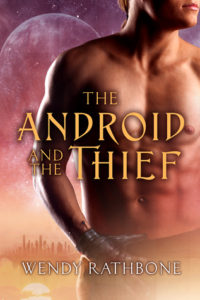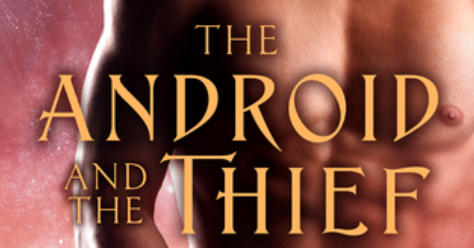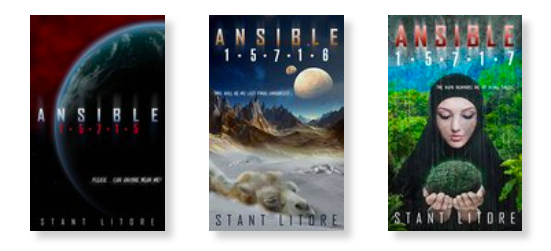 I received a copy of The Android and the Thief from the author, Wendy Rathbone.
I received a copy of The Android and the Thief from the author, Wendy Rathbone.
Description from Goodreads:
Will love set them free—or seal their fate?
In the sixty-seventh century, Trev, a master thief and computer hacker, and Khim, a vat-grown human android, reluctantly share a cell in a floating space prison called Steering Star. Trev is there as part of an arrangement that might finally free him from his father’s control. Khim, formerly a combat android, snaps when he is sold into the pleasure trade and murders one of the men who sexually assaults him. At first they are at odds, but despite secrets and their dark pasts, they form a pact—first to survive the prison, and then to escape it.
But independence remains elusive, and falling in love comes with its own challenges. Trev’s father, Dante, a powerful underworld figure with sweeping influence throughout the galaxy, maintains control over their lives that seems stronger than any prison security system, and he seeks to keep them apart. Trev and Khim must plan another, more complex escape, and this time make sure they are well beyond the law as well as Dante’s reach.
Review:
I liked but didn’t love this. Mostly because I really think it wanted to be a light fluffy read (and mostly was), but starting with a fairly detailed gang rape killed any real chance of succeeding with this. And I don’t even think showing the rape was necessary. The reader could have known it happened without all the details.
Setting the need for the rape scene aside, I liked both characters. They were each cute and cute as a couple. I can’t say I really felt any real chemistry between them, but I liked them. Beyond liking the characters though, I was iffy on a lot of the book. So many things pulled me out of it.
- Being set in the far distant future or a galaxy far, far away but people still ordering pizza, dressing just like we do today and reading Bradbury.
- The operas and such with names just a little off recognizable contemporary songs. I think it was meant to be cute, but it felt lazy.
- The questionable idea that anyone could plan and break out of a maximum security space prison, let alone do so easily.
- The coincidence of so many security setups had the exact same loophole for Trev to exploit.
- How easily Trev could do anything and everything, bypassing any system in seconds. Somehow even accessing things that shouldn’t be online at all.
- The ending, where everyone is presumed to live happily ever after, but there is nothing to suggest the bad guy (phrased that way to avoid spoilers) couldn’t find them just as easily as he did the first time.
- The painful lack of women. Even situations that easily could have women in them were declared “all-male.”
- The question of how and why Trev was apparenlty the only one in the universe who easily saw androids as human, if he was raised the same way as everyone else. What made him different?
- Similarly, why was he the only one in his family not to be criminally inlined if he was raised just like the rest of them.
- The term android, the reader is told repeatedly that android isn’t the correct term for androids, it’s an insult, but we’re never told what the correct term should be.
- How much of it was written in tell, instead of show.
- How little happened, considered it’s 294 pages long.
All in all, I’ll say this was a book I don’t regret reading, but I wasn’t blown away by it either. It was ok.


 I won an Audible copy of
I won an Audible copy of 
